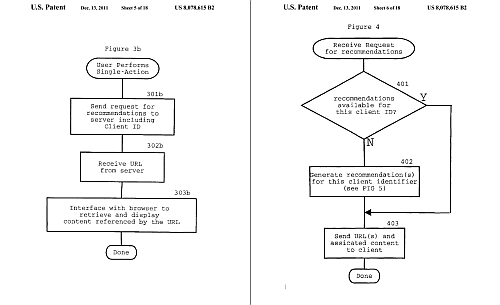Американский рекомендательный сервис StumbleUpon пожаловался на отечественный Surfingbird в администрацию AppStore. По мнению StumbleUpon, русские нарушили американский патент: "Method and System for Single-Action Personalized Recommendation and Display of Internet Content". При неблагоприятном для Surfingbird развитии событий их, как минимум, могут удалить из AppStore.
Патент 2011-го года описывает работу кнопок и серверной части рекомендательного сервиса. Например, описаны реакции на нажатия.
Для клиента есть рекомендация?
"Есть" — показать.
"Рекомендации не существует" — сгенерировать и показать.
Формально AppStore может отказать StumbleUpon. Код приложений не описывает запатентованных клиент-серверных методов; идентичные рекомендации можно получить в результате работы несхожих между собой алгоритмов. Apple не обязана сличать положения патента и код на сервере Surfingbird. Нарушение патента поддаётся опротестованию в американских судах. Однако сам процесс разбирательства может оказаться непростым. Суды иногда длятся годами, а адвокаты и экспертиза обходятся в миллионы. Длительные прения могут стать непосильными для молодого проекта.
Бэкграунд StumbleUpon и Surfingbird заметно различаются. Первый был создан ещё в 2001-ом году, к апрелю 2012 в американском сервисе было 25 миллионов аккаунтов. Surfingbird.ru запущен в марте 2011 года. По словам СЕО Surfingbird.ru Сергея Шалаева, у проектов пересекается "подача информации" — фрейм, внутри которого отображаются страницы, рекомендуемые пользователям. Но StumbleUpon более социальный продукт, а Surfingbird основан на классическом машинном обучении.
Обошедщийся в $1.2 млн инвесторских средств StumbleUpon в 2007-м году за $75 млн. был продан интернет-гиганту eBay. Однако позже сервис был выкуплен своими создателями обратно. Surfingbird привлёк $2.5 млн и возможно проведёт допэмиссию на значительно большую сумму в 2013-м году.


Привет. Я бы хотел обозначить нашу позицию и ответ сотрудникам Эплстор и юристам Cтамбла. Для тех кто не хочет читать все эти скучные телеги: Отличная попытка Стамбл, но нет, у нас устроено все по другому, и без деталей работы бекэнда это все тлен. «Thank you for drawing our attention to the StumbleUpon patent. We believe that the Surfingbird app, while it does provide personalized recommendations of Web content for its users, contains important differences from the method described in patent no. 8,078,615. 1. The patent describes a single-action personalized recommendation, and Figure 1 defines an interface with a single action «Stumble!». In the Surfingbird service, we provide the user with a possibility to choose specific categories for recommendations. This turns our recommendation system into a «quasi-browser» closer to a «next-generation Web portal» where recommendations are provided inside specific categories rather than a pure recommendation engine like StumbleUpon. This is, in our opinion, the most important difference related to the interface. 2. The patent indicates that the StumbleUpon engine «receives a content from a first URL from the plurality of previously stored URLs, the first URL corresponding to the first recommendation for content».Our engine improves upon this description; we use our own proprietary algorithms to choose among a relatively large number of precomputed recommendations based on the information recently made available, so instead of choosing the first recommendation for content we choose the best recommendation from a long list. This is, in our opinion, the most important difference related to the engine. We are certain that our backend recommendation engines are also very different, but they are not specified in the patent. 3. The patent makes several references to the browser toolbar which is an important part of the user interface; the Surfingbird app does not contain a toolbar, and the user interface is based on a different paradigm. 4. The patent indicates that «the first recommendation is determined based on the demographic information»; our algorithms for cold start recommendations are based on other kinds of information. There are also other minor differences. Thus, while we both work towards similar goals, we believe that we have chosen a different path than StumbleUpon. We hope we will be able to resolve this matter peacefully, and we sincerely hope that our further relations with StumbleUpon will be based on collaboration rather than competition (we are not in direct competition as we cater to different language markets).